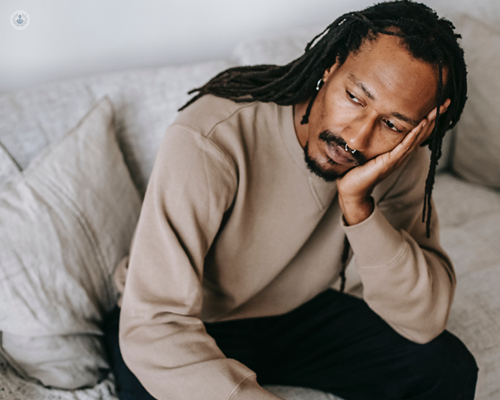Rectal bleeding: What are the causes?
Escrito por:Rectal bleeding can be caused by various different conditions, as explained by consultant general and lower GI surgeon Mr Segun Komolafe. He explains the different causes, symptoms and when to see a doctor in this informative article.

What are the most common causes of rectal bleeding?
The most common causes of rectal bleeding are really simple things. Non-malignant causes of rectal bleeding are more common, and these would be things like haemorrhoids, which are incredibly common. You can also have trauma to the back package resulting in a split in the back passage, call a fissure. That can also cause rectal bleeding.
As you go further into the bowel, you can have things in the rectum and sigmoid that bleed, such as polyps. They are very common in the UK and Scotland, in particular. Diverticular disease can also cause rectal bleeding.
Of course, malignant growths in the rectum and sigmoid colon, just above the rectum, can also cause rectal bleeding.
Can it be a sign of something serious?
Absolutely, because if you have cancer in your rectum or sigmoid colon it can give you bleeding. It can definitely be a sign of something serious.
The reassuring thing is that the vast majority of rectal bleeding causes, however, are benign.
When should you see a doctor?
If you have new rectal bleeding, I'd suggest that you should see a doctor. The only scenario where you maybe wouldn't see a doctor was if you're absolutely, categorically sure that you've had a fissure, a painful split in your back passage, and you've bled from that. Or, you have haemorrhoids and you're bleeding from them.
So, bright red, fresh rectal bleeding typically is coming from the anus. It's what we call anal rectal bleeding. Beyond that, it's certainly safer if you have new unexplained rectal bleeding, to see your GP.
What tests might be performed to establish the cause of rectal bleeding?
The first thing you do is find out about the symptoms that have come up through bleeding. So, the first test as it were is your own story of how you've started bleeding rectally.
Beyond that, the things you can do to establish the cause of rectal bleeding is to examine the back passage; have a look at it, including the outside and see if there's obvious, external haemorrhoids.
GP examination
Then the next thing is to do an internal examination to look for any obvious abnormalities in the anal canal, or the lower rectum.
Also, it's good to look at the colour of the bowel motions, because if there's fresh blood in it there's still active bleeding. Whereas if the stool colour is normal, you know the bleeding has stopped at the moment.
Further clinical examination
Beyond a clinical examination at your GPs practice, or if you come to the clinic where we'd see you, we'd then need to examine the rectum with a telescope of some sort to have a look within the rectum.
Either it would be a sigmoidoscopy, which examines the first 10 to 12 inches of the large bowel from your back passage inwards. Or, a colonoscopy, which examines the entirety of the large bowel.
If the cause is deemed not to be serious, how can rectal bleeding be treated?
If the cause of your bleeding is something like haemorrhoids, then we can band them endoscopically at the time of your assessment. We can also remove them surgically, if there are external haemorrhoids that stick out, for example.
If the cause is a fissure, we can give you creams to help them to heal. If it's diverticular disease, these tends to supplemented and come and go. One of the common causes of bleeding, actually, in many patients in the UK and Scotland certainly, are tablets like aspirin, rivaroxaban or clopidogrel. These are medications you take for your heart, making your blood thin but they also make you more prone to bleeding.
Sometimes, if your bleeding is particularly pronounced and we know there's a benign cause for it then we discuss it with your GP and cardiologist about whether or not you should be on a different tablet. Or change your tablets, and that can help to stop bleeding, as well.
If you're concerned about rectal bleeding, you can consult with Mr Komolafe via his Top Doctors profile.


